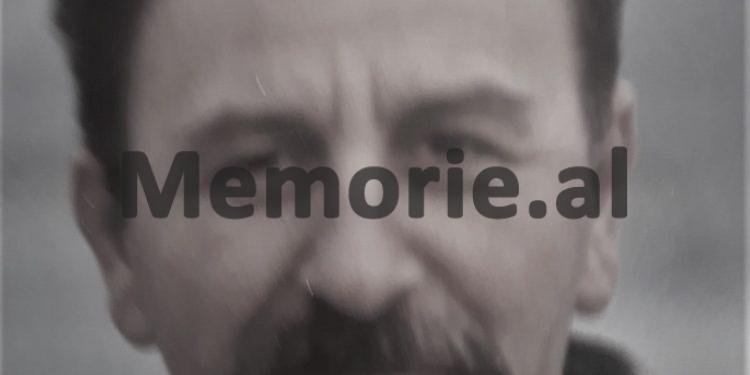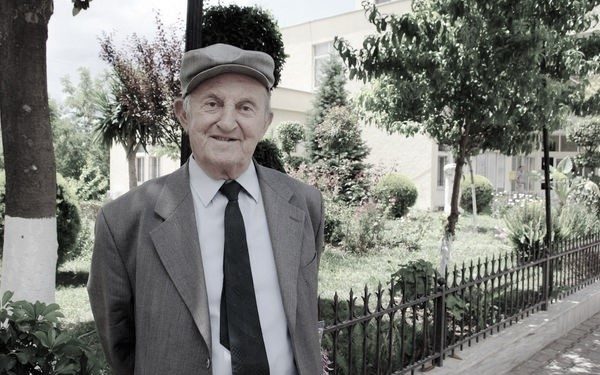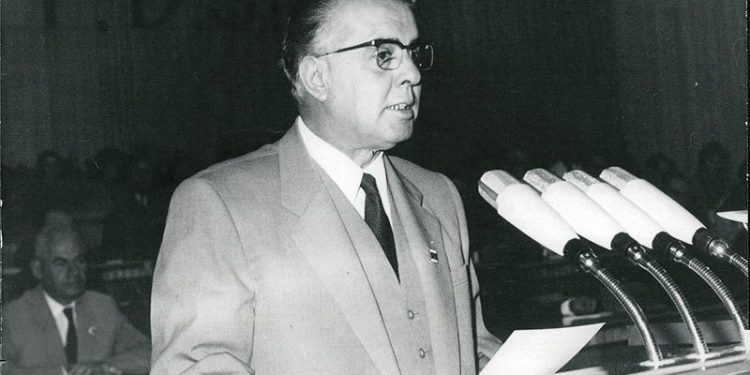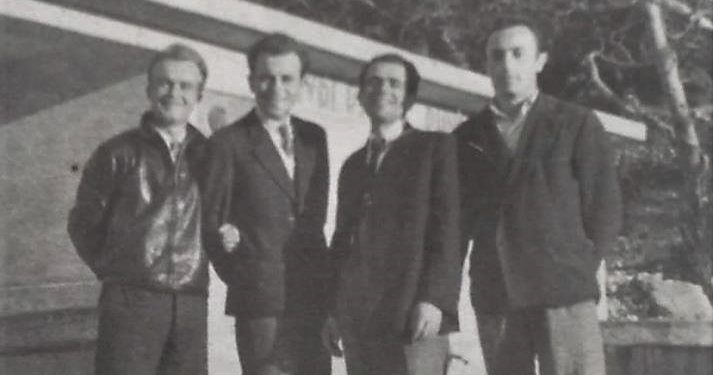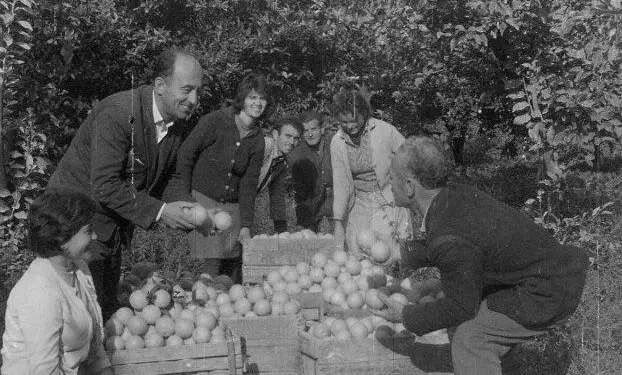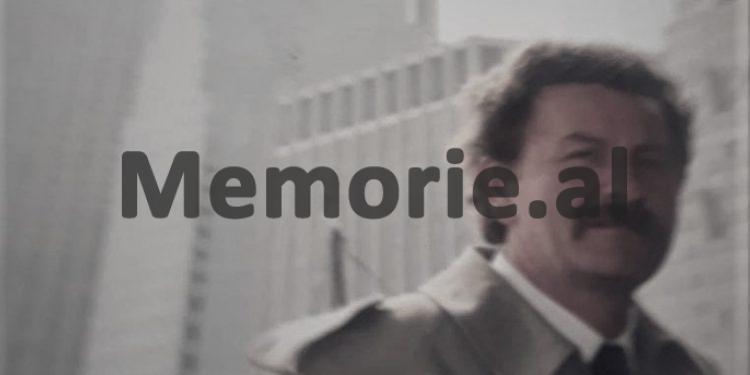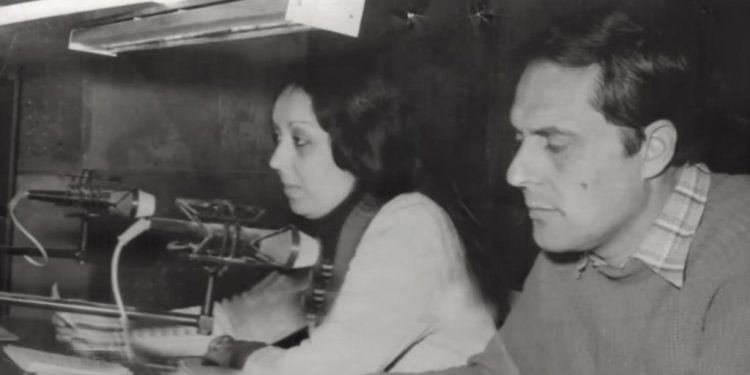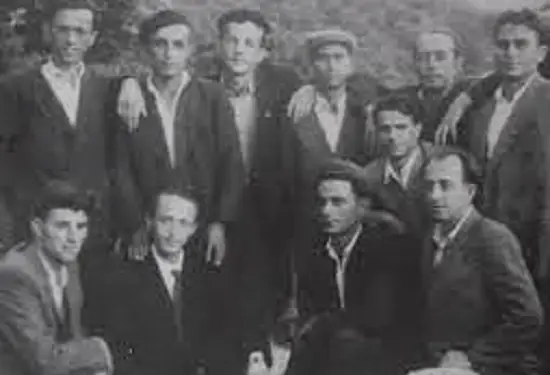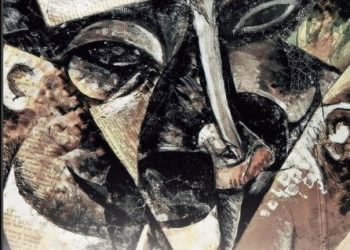By Bashkim Trenova
Part ten
Memorie.al publishes the memoirs of the well-known journalist, publicist, translator, researcher, writer, playwright and diplomat, Bashkim Trenova, who after graduating from the Faculty of History and Philology of the State University of Tirana, in 1966 was appointed a journalist at Radio- Tirana in its Foreign Directorate, where he worked until 1975, when he was appointed journalist and head of the foreign editorial office of the newspaper ‘Zeri i Popullit’, a body of the Central Committee of the ALP. In the years 1984-1990, he served as chairman of the Publishing Branch in the General Directorate of State Archives and after the first free elections in Albania, in March 1991, he was appointed to the newspaper ‘Rilindja Demokratike’, initially as deputy / editor-in-chief and then its editor-in-chief, until 1994, when he was appointed to the Ministry of Foreign Affairs. with the position of Press Director and spokesperson of that ministry. In 1997, Trenova was appointed Ambassador of Albania to the Kingdom of Belgium and to the Grand Duchy of Luxembourg. Unknown memories of Mr. Trenova, starting from the war period, his childhood, college years, professional career as a journalist and researcher at Radio Tirana, the newspaper ‘People’s Voice’ and the Central State Archive, where he served until the fall of the communist regime of Enver Hoxha, a period of time when he in different circumstances met some of the ‘reactionary families’ and their suckers, whom he described with a rare skill, in a memoir book published in 2012, entitled’ Enemies of the People ‘and now brings them to Memory readers. al
Continued from the previous issue
“Enemies of the people”
On radio Tirana
In the summer of 1966, as Haxhiu wrote to me on his postcard, I had started work. I was appointed as an editor in the Foreign Directorate of Radio Tirana or, as it was otherwise called, in the Foreign Radio. This Directorate was in charge of compiling, translating and broadcasting Radio Tirana shows for the outside world.
I was greeted on the Radio by Dhori Nini, a man in his forties, with dry bones and skin, as if he had just come from Mathausen.
I would then learn that he was the head of the Foreign Radio Information Office. Dhori served me some information taken from the News Bulletin of the Albanian Telegraphic Agency and told me to write an article. After reading it, he asked me to write two more articles. He finally told me that I had the “stuff” to become a journalist.
At our first meeting Dhori Nini accompanied me to a small office where two desks were set up. As I started reading the Bulletin of the Albanian Telegraphic News Agency, Jani Xhahini comes and sits at the free table in front of me. I learned his name later. We both witnessed for a few minutes an unpleasant scene. Jan and I did not even have time to introduce ourselves, when in the office of the boss, who was communicating with the office where we were both, a brunette man enters abruptly. He uttered a host of words and phrases, expressing anger, resentment, and insult. After it was completely emptied, he left. “It’s Hysen Pojani,” Jani told me, adding that after laughing bitterly, “Oh, how are you going to look here!” He was right in his “prophecy.”
I would watch a lot on Radio, but before I talk about it, I want to show what I saw in Zall Mner, in the Tirana Highlands, almost right after I started working in Radio. At that time, following the example of the so-called Great Chinese Proletarian Cultural Revolution, the Labor Party had decided, among other things, that intellectuals and the entire Albanian administration should work one month a year in a production center in the city or in an agricultural cooperative in the village and in the highlands. This decision was motivated by the necessity of recognizing the socialist reality by the social strata, which were considered too sensitive to the influence of bourgeois ideology.
With colleague Timoleo Mërtiri, in physical work in the village of Zall-Herr
I and Timoleo Mërtiri, together with Aleksandër Papa, both of these journalists of the newspaper “Bashkimi”, were informed by our respective institutions that we had to go to the highlands of Zall Mner, to do the physical work for that year. We would shovel the land together with the cooperators. The three of us met on the appointed day and set off for Zall Mner, not knowing well the path we had to follow. None of us had been there before. This small residential center was not connected by any road, bicycle or even cart to the rest of the country. Zall Mneri was completely isolated from the world. To get there, it took us several hours of walking and climbing and descending a couple of high mountains along goat trails. We finally arrived. As instructed, we sought the secretary of the Village Party. He would tell us where we would sleep, where we would work, how and where we would eat.
In Zall Mner, as in all the villages of Albania, there was no hotel or restaurant. There was not even a commercial unit where we could buy anything to eat. The village had only one small club where nothing was traded except a glass of brandy, plums and dried biscuits. I was surprised by this reality. In fact, about a year ago, while I was still studying, I happened to meet a young man from the villages of Lezha, a small town in northern Albania. I then went to study at the National Library. One evening as I was leaving her he stopped me, wanted to ask me about something. The conversation with him apparently impressed me, because I also faithfully put it in my diary:
“Tuesday 30-XI-1965. Tonight leaving the Library, I accidentally met a villager from Lezha. He asked me where the Inner Branch is. They had stolen 570 All. He told me that tomorrow he would go to the Central Committee of the Party, to meet any great. The villager from Lezhë would ask him to get his passport in Tirana or to throw him in jail. He complained about life in the village; always work, know no day of rest and no amusement, and what do you get? Eight All per day! That’s a lot! Yes, why not go to Shkodra, I said? -Oh no! O in Tirana, o in prison, he told me. “He was a young boy, maybe 24-25 years old, charming.” The villager from Lezhë had thus given me a vivid picture of life in the village. He was willing to replace village life with prison life! However, Zall Mneri was my first surprise with the “happy” reality of our socialist village, as the Party propaganda bombarded us every day and every evening. She would not be alone. A series of other surprises would follow.
We arrived in the village at an inconvenient time. The party had decided to halve the garden, which surrounded every country house and was worked by the locals to cope with the extremely difficult daily living. She had decided that half of it should be transferred to the joint cooperative property and only the rest should be left to the peasant for his needs. The party thought that this would connect the peasant more with the cooperative property, which in reality was a utopia, which eventually ruined the village and the Albanian peasant. On the other hand, the civic market, which had the village as a supplier of fruits, meat, milk, eggs and vegetables, was emptied.
In the circumstances in which we arrived in Zall Mner, the villagers thought we were Party instructors, and therefore did not even want to greet us, let alone receive us into their homes. They had abandoned the fields and nuts as a sign of dissatisfaction or revolt.
The first night we slept at the house of the village Party secretary. We spent the next few nights in the communist houses. Once we slept with the goat of the master of the house. Only a small “wall” of twigs separated us. We spent most of the nights in the village nursing and on the village school desks. The village nurse, Kliton Qazimi, an always smiling and hospitable boy from Tirana, gave us shelter in the infirmary. We were sheltered at school by Xhevat Lahi, the school principal. I knew Xhevat. We were both former students of the “Çajupi” gymnasium. Our houses in Tirana were not far from each other. Without Xhevat, perhaps, we would have been left in the open in Zall-Mner.
My speech in front of the villagers of Zall-Mner, about the “happy life” that the Party had brought us!
During the day Timo, Sandri and I were shoveling a plot of land. They also brought us there to eat lunch, leeks mixed with corn flour and vinegar with a little sugar inside. In the occasional meetings and conversations we had with the peasants, even with the communists, everyone openly expressed their opposition to the Party’s decision regarding the family garden or, in other words, the cooperative yard. A village meeting was also held on the issue. There, for the first time, I heard angrily spoken against the Party. A woman stood up and demanded that the Party take the Kalashnikov and kills them all, because they had nothing left in the village but their souls! I also spoke asking them to trust the Party, that it does everything for their good. I told them that I worked for Radio Tirana, for broadcasts to the outside world, and that hundreds of thousands of letters came to Radio from all over the world, that these letters expressed the great love and respect for the Albanian Labor Party and comrade Enver Hoxha. This rally yielded no results. Timoleo then said to me: “Those words of yours, they neither understand nor understand.” Timoleo or Timo, had been quite young, almost childish, partisan. Since then he had stored a pistol, which he had also taken with him to Zall Mner. In fact this village was known as the area where, as it was said, the reaction had too much influence. The pistol, it seems, gave him security.
After a few days, to “normalize” the situation came to Zall Mner, the party secretary of Region no. 4, i.e., of the villages and highlands of Tirana, Jovan Bardhi. Jovan would meet with the villagers, but at first he called and talked face to face with those known as the leaders of the reaction. He threatened them with imprisonment if they would speak out against halving the cooperative courtyard. He then called the village communists and told them that, at the next meeting with the villagers, they should approve the halving of the cooperative yard, and otherwise they would be expelled from the Party. Expulsion from the Party was then considered a political shooting. The consequences were terrible. After these preparations, in Jovan Bardhi’s meeting with the villagers, the communists showed “solidarity” with the Party, the “reaction” was silent. Jovan asked if anyone loves the word. No one dared to speak. Jovani said: “Since no one likes the word and since no one spoke out against cutting the cooperative yard, it means that you all agree. So I call the meeting closed”!
I was surprised not only by the rejection and anger of Zall Mner’s villagers, but also by the way the Party provided “solutions” to problems. After returning from Zall Mneri, I talked about my concerns with the secretary of the Radio Party, Klimi Misja, a wise, noble man, without complexes of authority and who enjoyed respect among the employees of Radio Tirana.
The tragic end of my colleague, who dared and wrote about Gjirokastra!
To conclude with Zall Mner, I also want to show that Timo, who spoke fervently to the villagers about how happy their lives would be, what a magnificent project the Party had for the socialist village, would join him, unintentionally. , with those who were “stained in the biography”. Timo published one day in “Bashkimi” the article entitled “Ku Qafa e pazarit dhe ku Dunavati”. The article posed problems for the poor trade network in Gjirokastra, the dictator’s hometown. He, after reading the article, had said: “The elders of Gjirokastra, put the tin to such journalists as Timoleo Mërtiri”. Timoleon was removed from the newspaper, removed from Tirana and taken to Saranda, the southernmost city in Albania. There, alone, he awaited death.
In Radio Tirana, in the editorial office of Foreign Radio
I started working on August 4, 1966 at the Foreign Radio, in the West Editorial Office, together with Dervish Dumi and Albert Shala. This editorial office prepared and broadcasted programs for England, France, Italy, Germany and Greece. The three of us settled into an office. I knew Dervish and Albert in some way as students. We, even being from different faculties, had done some lectures, such as those of dialectical materialism or historical materialism, together. As editor-in-chief we had Findia Veizi, a man in his forties, gray-haired, calm and very kind to us young people. He generously assisted us in our first steps in journalism.
We soon learned that Findia also had a “stain” on her biography. Like my former school principal, Sofokli Afezolli, and other Communists on Radio Tirana, Findia had received a blow as a supporter of the 1956 Tirana Party Conference. He was terrified even ten years later when we started work at Radio Tirana. It seems to me that fear did not leave Findia for the rest of her life. I met him once on the street near his house, after he had retired, at the time when the Democratic Movement had started and I was engaged with numerous articles against dictatorship, published in “Democratic Renaissance”. I was then a father with two children, but Findia, after embracing me, like a good father, advised me: “Be careful, be careful”! He was very attentive to us young people throughout the time we worked with him. In a way, we were lucky to have Findian as editor-in-chief.
Here, in this editorial office, without much time, the “prophecy” of Jani Xhahin would be confirmed. It was the time of the Great Chinese Proletarian Cultural Revolution. The leader of the Chinese Communist Party, Mao Zedong, had chanted the slogan “destroy the headquarters of the bourgeoisie and the counter-revolution”! At the head of these headquarters he had declared, among others, Liu Shao China, the number two of the communist regime in China. Liu Shao Qi, was declared by Mao Zedong as the Chinese Khrushchev. To today’s youth, names like Mao Zedong or Khrushchev may sound far-fetched or they may not be heard at all. In our youth, educated by the teachings of the Party, Mao Zedong was the greatest Marxist-Leninist of the time, while Khrushchev was the number one enemy of Marxism-Leninism, that is, of the Chinese Communist Party and the Albanian Labor Party. He was a renegade, a revisionist, an ally of American imperialism, and even worse, his agent, sold for 30 aspra.
The fatal mistake of the office colleague, who compared Mehmet Shehu with Khrushchev?
The Great Chinese Proletarian Cultural Revolution had its great echo in our country, in political, social and cultural life. One day, while the three of us, Dervishi, Alberti and I, were talking about this “revolution”, Hysen Pojani enters our office. He listens to Dervish making the same comparison between China and Albania. Dervishi, who always felt the same absolute security in his opinion, was saying that “we in Albania, too, can have our Khrushchev.” Of course, he thought he was talking to colleagues with whom he could share his thoughts on various issues that concerned us. The three of us were young and, why not, even enthusiastic that in the position we held, we would judge world events and personalities, just and unjust wars, revolutions and pseudo revolutions. We also had the same complacency that, through Radio Tirana, our opinion would be heard everywhere in the world. Thus, at least, we thought at the time. Dervishi did not even intend to make any comparison between China’s number two, Liu Shao Chia, and Albania’s number two, Prime Minister Mehmet Shehu. What Dervishi and the rest of us who heard it did not think, Hysen Pojani thought in the meantime.
Hyseni hurried to the secretary of the Albanian Radio-Television Party, Klimi Misja, and told him what Dervishi had said in the presence of Albert and mine. It turned out that Dervishi, talking about a possible Khrushchev in Albania as well, had questioned the Prime Minister of Albania, even though he had not even mentioned him. The three of us, Dervishi, Alberti and I, spoke at a collective meeting that was organized for this purpose, at the request of the Party organization. Alberti and I, as far as I remember, accepted that the conversation had taken place, adding that, in any case, Dervishi in no way intended to specifically address Comrade Mehmet Shehu with his words. We said that Dervishi was loyal to the Party, etc., etc. Others spoke at the meeting, but not Hysen Pojani. He was not even present. A colleague of ours, Thimi Çollaku, who had been working in Radio for years, told us that this is how Hyseni used to “throw the stone and hide his hand”. The dervish himself felt revolted. With the same pathos, he said that if he was thought to be against the Party, let them take his heart, throw him in the street and trample him! My heart, he said, sincerely, is the heart of the Party. After saying these words, he left the meeting of the collective, left the hall.
This story ended thankfully without consequences. We continued to work for three more years at Radio Tirana. Dervishi did well as a journalist and his articles were appreciated even beyond the walls of our institution. He left Radio to work at the Foreign Ministry. Later, together with Arshin Ruçaj, another Foreign Radio journalist, after becoming a member of the Party, he joined a working group in the Central Committee of the Party. The leader of this group was Sofokli Lazri, the gray eminence of the propaganda of the Albanian Labor Party. In many cases, for years, he has been the black pen of dictator and dictatorship.
The sentence of colleague Duma, after he spoke about Kosovo in the Central Committee of the ALP
Dervishi as a character could not go with Sofo Lazri. He was not servile, he did not lick, he demanded that his opinion be heard. Sofo was cynical and disrespectful to others. At a meeting of the party’s grassroots organization in the Central Committee, Dervishi spoke about Kosovo, giving his completely original opinion. He forgot that in the Central Committee, he was called not to give an opinion, but to execute the opinion of the Party. Dervish was removed from the Central Committee and sent to the Publishing House “Naim Frashëri”. Then they removed him from there as well, leaving him completely unemployed for some time. I met him in those difficult days and he told me that he did not even have money to buy a piece of bread, to feed the children. He was finally offered a job as a proofreader at the Polygraphic Combine. It was also occupied by the violent events that led to the end of communism. Dervishi engaged in drafting the statute of the first independent trade union organization of Albania. He wrote several articles against the dictatorship in the newspaper “Sindikalisti”, of this organization as well as in “Rilindja Demokratike”, a body of the Democratic Party, which would lead the popular movement for the overthrow of the dictatorship.
In the years of democracy Dervishi worked in the Ministry of Foreign Affairs as Director of the Directorate for Multilateral Relations. I happened to work here for a while again with him in 1994 when I was appointed as the spokesman of this Ministry and as the Director for Press and Information. The Minister of Foreign Affairs was Alfred Sereqi. Rebel in blood, Dervishi did not spend peace with Sereq either. I spoke to him once and told him that if he continued as he had started, they would remove him from the Ministry. “Let them take me away, I will go out to sell bananas,” he told me. I told him that I, yes, could go out and sell bananas, but that aristocratic refinement would not leave him. Dervishi, after telling Sereq in an ordinary meeting of the Collegium of the Ministry that the wind was blowing m …, after asking in another meeting to explain to him why it should be convened and when the Collegium was to be convened, initially left as an employee of simple embassy in Vienna, from where he returned to Albania after almost a year to retire.
I looked for Dervishi in September 2010 during a week-long stay in Tirana. He had changed his address so I had a hard time meeting him. A gypsy named Butterfly helped me. I met him by chance. She remembered me from the time she worked as a postman in our neighborhood. As a former postman, she had in her mind the addresses of the residents of the neighborhood, including Dervish. The butterfly found a way to notify Dervish, whom he briefly told me was unlucky.
It was not long before Dervishi came to the bar where I was waiting for him. He was devastated, sick. The pension did not even allow him to buy the medicines he needed for his health in a marked decline. He has dreamed of a small house with garden at the entrance. On an unlit street on the outskirts of Tirana, he had built only the ground floor, working himself as a construction worker. I accompanied him to the entrance of the house. Dervishi told me: “Bashkim, I do not invite you to go inside, because you will see not a house, but a mess warehouse. I live here”. When he opened the courtyard door, a small dog barked at him. He yelled at them to get away, but the dog had shot stubbornly, like the master. To humorously part with Dervish, I said to him: “Hey more Dervishes, not even your dog knows you as a master”! I thought to myself something else, how many dogs bit him, bleeding the life of Dervish, my friend full of ambition and dreams, with knowledge to be coveted and rare devotion at work.
The blow to the other colleague, Arshi Ruçaj, who did his internship in Fierza!
The blows of the dictatorship would not be avoided even by Arshin Ruçaj. Prior to being appointed to the working group of the Central Committee of the Party, he worked for three years as an unskilled worker in the construction of the Fierza Hydropower Plant, in the deep highlands of Northern Albania. Here he was sent to test whether he deserved to become a member of the Labor Party or not. From Fierza, one day he sent me a letter and an article written by him, asking me to pass it to the relevant section of the newspaper “Zeri i Popullit”, where I was working at the time, and to be interested in its publication. The publication of this article in the central body of the Party, on the eve of the inauguration of the Fierza Hydropower Plant, would certainly attract the attention and appreciation of those who would decide on the acceptance or non-acceptance of Arshin as a member of the Labor Party. Arshini knew this, so in his letter he wrote to me: “As you helped me in the past, help me now.” Memorie.al
The next issue follows




